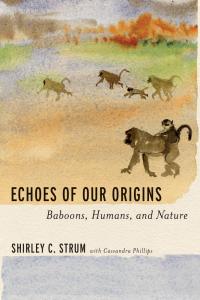 Echoes of Our Origins: Baboons, Humans, and Nature
Echoes of Our Origins: Baboons, Humans, and Nature
Johns Hopkins University Press, 2025
Agent: Elise Capron
The amazing chronicle of a primate scientist's fifty-year journey studying baboons—and what her findings can tell us about primates, resilience, and human coexistence.
In 1972, renowned anthropologist Shirley C. Strum traveled to Kenya to study the origins of human aggression through observing baboons. What Dr. Strum discovered completely defied her expectations, scientific notions about baboons, and even well-established assumptions about primate behavior writ large. In Echoes of Our Origins, Strum takes readers on an extraordinary fifty-year journey alongside baboons, creatures that transformed not just her scientific understanding, but also her perspective on life, people, nature, and evolution.
Strum's groundbreaking research began when she embarked on fieldwork in Kenya. Observing the lives of these social creatures, Strum uncovered their unexpectedly complex strategies of negotiation, collaboration, and resilience in the face of adversity. From exploring the evolution of social bonds and trust in baboon society—a common idea today but not then—to confronting the consequences of human-wildlife conflict, Strum illustrates what it means to coexist with the natural world and question our role within it.
With insights drawn from half a century of living among and studying baboons, Strum reflects on the delicate balance of nature and humanity, how science itself must evolve to see beyond its rigid frameworks, and how to think about evolution. This profound narrative challenges readers to look anew at not only baboons but also the very methods by which we understand the animal kingdom—and ourselves. Equal parts natural history, adventure story, memoir, and call to action, Echoes of Our Origins will engage, enlighten, and contribute to the vital conversation about our natural world and how to ensure its survival.
Reviews:
"Reading Echoes of Our Origins, it is easy to see why Strum is such a legendary figure in anthropology for her research. She offers us a rare glimpse at not just the science but the scientist, and reveals the many personal, moral, and philosophical choices that go into a lifetime of transformative work. Strum was changed by baboons, and in telling us about them, she changes us. A must-read for anyone interested in nonhuman animals, or the human animal." —Alexandra Horowitz, author of Inside of a Dog: What Dogs See, Smell, and Know
"Dr. Shirley Strum has for decades been one of the world's most innovative primatologists, a true outside-the-box pioneer. Here she has painted for us a warm, insightful, and inviting memoir of a scientific life among close human relatives. Some of those relatives are human. The others are—as Shirley would say—almost human." —Carl Safina, author of Beyond Words: What Animals Think and Feel
"Baboons are rife with contradictions. They're just like humans; they're hardly at all. They affirm models concerning the evolution of social behavior; they're too smart and idiosyncratic to conform to anything. They are highly adapted; they make strategic mistakes. Their nature prompts scholarly insights; their nature prompts you to love them. Renowned primatologist Shirley Strum recounts her fifty years spent navigating these contradictions, in continuous study of a population of wild baboons. She adeptly intertwines the science with her lifetime's devotion to these animals; the results are fascinating and moving." —Robert Sapolsky, author, Determined: A Science of Life without Free Will